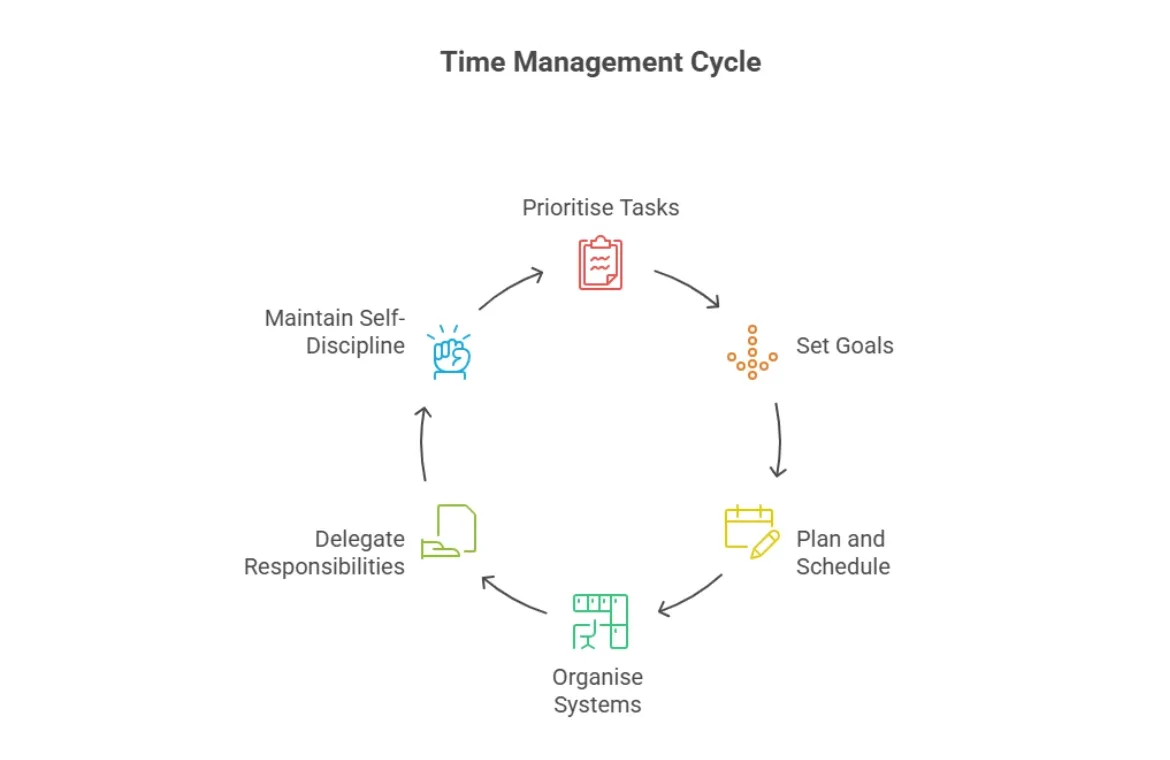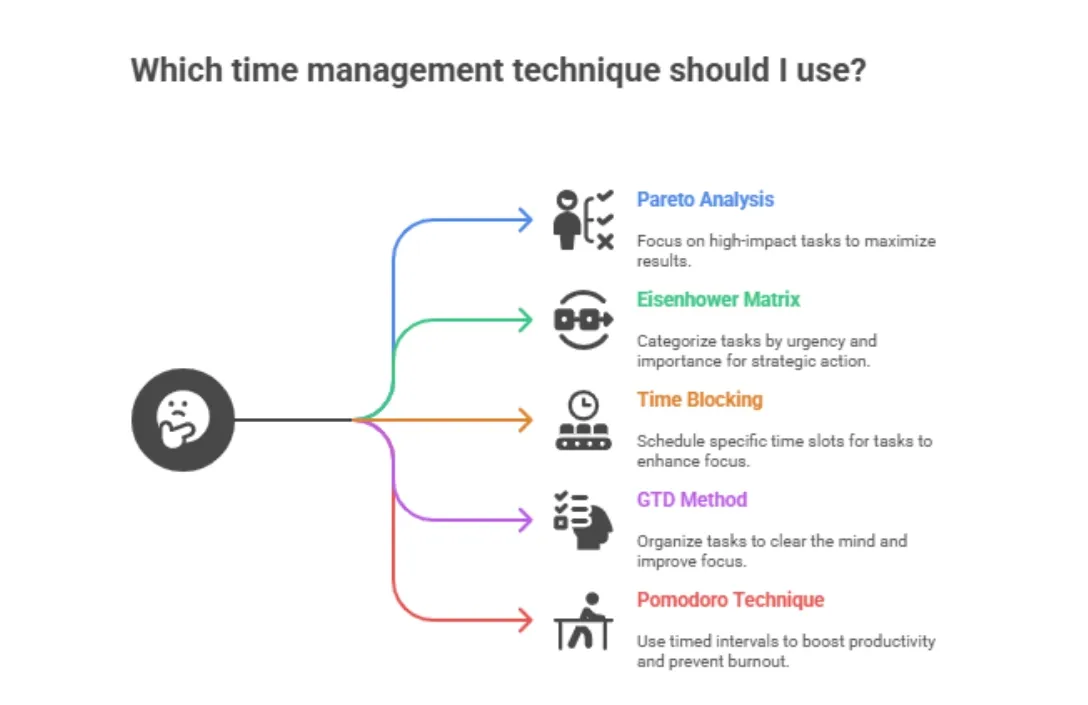Best Time Management Strategies to Drive Business Success

In leadership, time is not just a resource it is a competitive advantage. Senior executives and business leaders often find themselves navigating complex priorities, high-stakes decisions, and relentless demands on their attention.
Yet, those who master time management know it is less about clock-watching and more about creating impact. Strategic use of time can distinguish a visionary leader from a reactive one, enabling sharper focus on long-term goals while ensuring operational excellence. In a world where every hour carries financial and organizational weight, effective time management becomes the silent engine of growth, innovation, and sustained success.
Absorb what is useful, reject what is useless, add what is specifically your own." - Bruce Lee
Research shows that all but one of these workers struggle with motivation and focus. Becoming skilled at time management helps professionals balance their work and personal life.
What is Time Management?
Time management is the backbone of professional productivity. It helps you plan and control the time you spend on activities to boost effectiveness, efficiency, and productivity.
Core principles of Time
The art of planning your time well is time management. Professionals who manage their time well can complete tasks within deadlines. They know how to prioritise tasks so urgent or important items get done before less critical ones.
The core principles of time management that work include:
- Prioritisation: Understanding which tasks matter most and are urgent, then focusing energy to complete those first
- Goal setting: Defining specific, measurable, achievable, realistic, and time-bound objectives
- Planning and scheduling: Creating structured plans for daily, weekly, and monthly tasks
- Organisation: Maintaining systems that support productivity and efficiency
- Delegation: Transferring responsibility to others at the right time
- Self-discipline: Maintaining focus and resisting distractions
These principles create a framework that boosts productivity and makes following time management strategies easier. On top of that, it helps professionals develop routines that become positive habits.

Why is time management important in business?
Time management is the backbone of business success. By setting clear priorities and working within structured timeframes, professionals not only complete tasks efficiently but also improve focus and quality. For organizations, strong time management practices ensure projects are delivered on schedule, building customer trust and strengthening relationships.
It also equips teams to handle unexpected challenges without derailing daily operations, a critical advantage for small businesses where efficiency is non-negotiable. Beyond productivity, effective time management reduces stress, sharpens decision-making, and supports better work-life balance. Together, these benefits create a culture of reliability and resilience that drives long-term growth.
Key time management skills for professionals
Becoming skilled at time management requires specific skills such as:
- Organisation - Keeping track of responsibilities and priorities to guide daily activities
- Prioritisation: Making sure important tasks get done first
- Communication: Expressing plans and goals clearly to build trust and understanding
- Planning: Creating effective structures to avoid confusion and stress
- Delegation: Managing multiple tasks by assigning work properly
- Stress management: Handling pressure positively to stay motivated
- Flexibility: Keeping schedules somewhat adaptable for unexpected changes
- Goal setting: Setting clear objectives with measurable outcomes
- Decision-making: Choosing how to use time wisely
These skills help professionals work smarter rather than harder. Yes, it is true that mastering time management creates a positive cycle as skills improve, productivity rises, leading to greater confidence and continued success.
Time management ended up giving professionals more choices about their time use, creating opportunities for both professional achievement and personal fulfilment.
Also Read: Learn Essential Time Management Skills for Improving Work Efficiency
Proven Time Management Techniques
Becoming skilled at time management can change how we work and get results. These tested methods help us handle workloads better, cut down distractions, and boost what we achieve.
Pareto Analysis (80/20 Rule)
The Pareto Principle tells us that about 80% of results come from 20% of what we do. Italian economist Vilfredo Pareto noticed something interesting back in 1896 - just 20% of people owned 80% of Italy's land. This same idea works great for managing time.
The quickest way to use this approach is to spot which tasks make up your vital 20%. Put your energy into these high-value activities first. This helps you spend time where it counts most and get the best results from your schedule.
The Eisenhower Matrix
President Dwight D. Eisenhower's four-box system helps sort tasks by how urgent and important they are. The matrix splits tasks into:
- Do First: Tasks that need your attention right now
- Schedule: Important work that you can plan ahead
- Delegate: Urgent tasks others can handle
- Don't Do: Tasks that aren't worth your time
This system helps you make smart choices about your time. It shows the difference between what just seems urgent and what really matters.
Time Blocking
Time blocking means splitting your day into chunks for specific tasks or similar activities. Instead of a never-ending to-do list, you create a clear schedule that shows exactly what you'll do and when.
Start by listing and ranking your tasks. Then put specific time slots on your calendar for each task or group of tasks. This cuts down on switching between different types of work and creates quiet periods for focused work - what many call "deep work" sessions.
Getting Things Done (GTD) Method
David Allen created the GTD method to help get tasks out of your head and onto paper. The system has five steps: catch everything that needs doing, figure out what each thing means, sort them into groups, look at your lists often, and take action.
The main idea is simple but powerful - your brain works better when it's not trying to remember everything. A good system catches all your tasks and projects so your mind can focus on what you're doing right now.
Pomodoro Technique
Francesco Cirillo came up with this idea in the late 1980s. You use a timer to work in 25-minute blocks with 5-minute breaks between them. After four "pomodoros," you take a longer break of 15-30 minutes.
This method helps curb procrastination because it's easier to start a short work session than face hours of non-stop work. The regular breaks keep your mind fresh and stop you from burning out.

Why Time Management Is the Key to Success?
Time management does more than just organise tasks. It powers business success in many ways. The benefits show up right away and last long-term, going way beyond just getting more done. Companies that welcome strong time management cultures gain a real edge over their competitors.
Boosting Focus and Efficiency
Workplace distractions cost hours of productivity, with executives often pulled in multiple directions. Structured time management methods like time blocking or the Pomodoro technique help leaders protect focus, sustain flow, and drive higher-quality output. By channeling energy into high-impact priorities, professionals achieve more in less time, avoiding wasted effort and decision fatigue.
Enhancing Work-Life Balance
Clear boundaries between work and personal time prevent burnout. Leaders who model disciplined schedules foster healthier teams that return recharged, resilient, and more productive.
Driving Long-Term Business Growth
Organizations that manage time effectively outperform rivals delivering projects on schedule, seizing opportunities quickly, and fostering innovation. Research shows employees with optimized workflows are significantly more likely to exceed expectations, fueling growth and retention.
Common Challenges
Even seasoned professionals face obstacles like procrastination, constant interruptions, poor prioritization, and overcommitment. Recognizing these patterns and applying tools like the Eisenhower Matrix, focus blocks, and clear boundaries empowers leaders to stay strategic while avoiding burnout.
Tools and Apps to Enhance Productivity
The right digital tools can make a huge difference in how you manage your time. These applications help optimise workflows and increase efficiency through better task organisation and focus tools.
Trello: Visual task management
Trello organises tasks using a Kanban-style visual board system. Users create cards for each task and move them between columns that show different completion stages. The platform's drag-and-drop interface makes task management simple. Users can customise their boards, lists, and cards to fit any workflow.
Notion: All-in-one workspace
Notion works as a flexible workspace where you can manage notes, tasks, and projects. Users build custom workspaces that match their specific needs. The platform lets teams collaborate in real time and work together on group projects easily. Everything from databases to wikis and task management systems lives in one tool.
Asana: Team collaboration and tracking
Asana brings together communication, task assignment, and project tracking in one place. Users can view their work through lists, boards, timelines, and calendars. Teams and departments stay connected while tracking tasks across projects. Task updates show up instantly in all related projects.
Google Calendar: Scheduling and reminders
Google Calendar makes managing availability and scheduling appointments quick. Users can view multiple calendars at once for a complete schedule overview. Events from emails about concerts, flights, or reservations get added automatically. Teams can coordinate easily because calendars are shareable.
Focus@Will: Music for concentration
Focus@Will creates specialised audio that helps you concentrate better. The music plays in carefully timed sequences that maintain focus and cut down distractions. Users typically enter a focused state within 20 minutes thanks to these audio tracks. Different channels suit various cognitive types.
Comparison of features and use cases
| Tool | Key Feature | Best Use Cases |
| Trello |
|
|
| Notion |
|
|
| Asana |
|
|
| Google Calendar |
|
|
| Focus@Will |
|
|
Conclusion
Time management makes all the difference in professional success. Leaders who master these strategies gain a clear edge with sharper focus, higher productivity, and a healthier work-life balance. Smart techniques and digital tools help beat procrastination, streamline priorities, and ensure consistent results. Beyond personal discipline, pursuing a business management course can further strengthen your knowledge and leadership skills, equipping you to make strategic decisions, manage teams effectively, and build a career that thrives in a competitive business landscape. With the right balance of skills and strategies, time management becomes the foundation for lasting success in business.
Frequently Asked Questions
Q1. How can I improve my time management skills?
To enhance your time management skills, start by prioritising tasks using methods like the Eisenhower Matrix, implement time blocking for focused work, and utilise productivity apps to streamline your workflow. Regular practise of these techniques will help you become more efficient and productive.
Q2. What are the benefits of effective time management in business?
Effective time management in business leads to increased productivity, improved work quality, reduced stress levels, and better work-life balance. It also contributes to long-term business growth by allowing more time for strategic planning and innovation.
Q3. How can I overcome procrastination?
To overcome procrastination, break large tasks into smaller, manageable chunks, set short work periods with breaks (like the Pomodoro Technique), and identify your most productive time of day for tackling challenging tasks. Remove distractions and create an environment conducive to focused work.
Q4. What are some recommended time management tools?
Some popular time management tools include Trello for visual task management, Notion for customisable workspaces, Asana for team collaboration, Google Calendar for scheduling, and Focus@Will for concentration-enhancing music. Choose tools that complement your workflow and preferred time management techniques.
Q5. How can I deal with workplace distractions?
To manage workplace distractions, create designated quiet spaces, use noise-cancelling headphones, and set your devices to "do not disturb" mode during focused work sessions. Communicate your availability to colleagues using status indicators or closed doors to establish necessary boundaries and minimise interruptions.

TalentSprint
TalentSprint is a leading deep-tech education company. It partners with esteemed academic institutions and global corporations to offer advanced learning programs in deep-tech, management, and emerging technologies. Known for its high-impact programs co-created with think tanks and experts, TalentSprint blends academic expertise with practical industry experience.



